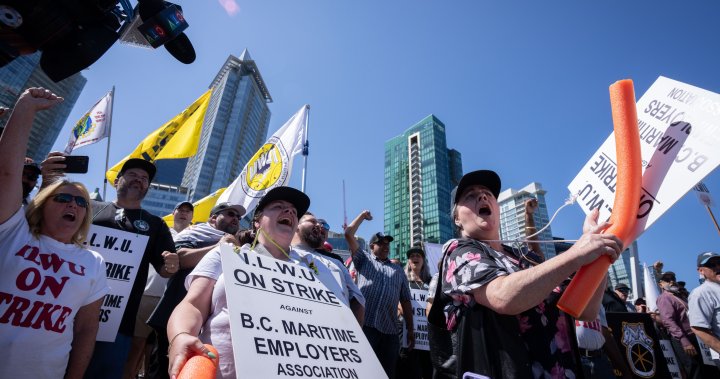The ongoing work stoppage at B.C. ports has caught the attention of the Canadian Federation of Independent Business (CFIB), who are demanding an end to the strike. According to the CFIB, the strike has impacted half of small businesses in the country. The strike, which has been going on for 11 days, has led to a buildup of shipping containers at some of Canada’s busiest ports. Over 7,400 workers walked off the job on Canada Day in pursuit of better wages and job security from B.C. maritime employers.
A survey conducted by the CFIB revealed that 53% of the 1,400 business owners surveyed have been affected by the strike since July 6. However, 16% said the strike would have no effect on their businesses, while 31% were unsure of the impact.
Among the affected businesses are an Ontario retailer awaiting shipments of clothes and footwear for the back-to-school season, as well as an Albertan construction company relying on steel to complete projects on time. The Port of Vancouver and other west coast ports play a crucial role in Canada’s economy as they handle goods coming to and from Asia. Experts warn that the longer the strike continues, the higher the price of goods for Canadians.
Nutrien Ltd., a fertilizer company based in Saskatoon, has already curtailed production at its Cory potash mine due to the strike and fears that it may also impact its other potash mines in Saskatchewan.
The CFIB is calling on the federal government to intervene and end the strike by enacting back-to-work legislation. Three-quarters of the businesses surveyed believe that the government should prioritize resolving the strike.
Jasmin Guénette, VP of national affairs at CFIB, emphasized the urgency of the situation, stating that the federal government must protect small businesses that are still recovering from the impacts of the COVID-19 pandemic and supply chain disruptions.
Although the federal government and provincial governments have urged both the International Longshore and Warehouse Union Canada and the B.C. Maritime Employers Association to return to the negotiation table with federal mediators present, there has been no progress towards a resolution. The union has accused employers of relying on the government to resolve the dispute instead of engaging in meaningful negotiations.
In May, CFIB also called on the government to end the Canada Revenue Agency strike, which was eventually resolved through bargaining. The CFIB believes that recalling Parliament from its summer break and enacting back-to-work legislation is necessary to resolve the port workers’ strike.
In conclusion, the CFIB is demanding an immediate end to the B.C. port strike, as it is severely affecting small businesses across the country. The federal government has been urged to intervene and resolve the strike through legislative action.
Denial of responsibility! VigourTimes is an automatic aggregator of Global media. In each content, the hyperlink to the primary source is specified. All trademarks belong to their rightful owners, and all materials to their authors. For any complaint, please reach us at – [email protected]. We will take necessary action within 24 hours.


